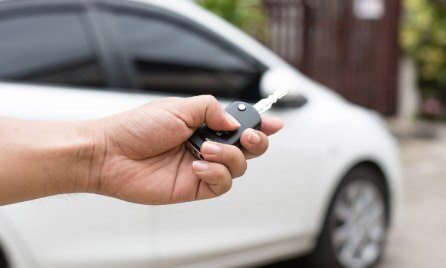- text
-
° This offer is only available for policyholders who have a registered Everyday Rewards Card linked to their eligible active Everyday Insurance policy. This offer is limited to one in-store Woolworths Supermarket transaction up to $500, with a maximum saving of $50 per Everyday Rewards Card, per month, regardless of the number of Woolworths services you use. For full T&Cs click here.
Car Insurance for older drivers.
Car Insurance | 3 minute read | 3 July 2025

- Rules and regulations for older drivers in Australian states and territories.
- Important considerations for older drivers.
- Understanding how age impacts car insurance premiums.
- Factors beyond age that could influence premiums.
- What Car Insurance policies does Everyday Insurance offer?
- Frequently asked questions about car insurance for older drivers.
- Why pick Everyday Car Insurance?
For many Australian seniors, driving is essential for independence and freedom, yet understanding car insurance in later years can be a complex journey. While age can influence premiums, it's not the sole factor, as seniors can also benefit if they have an extensive safe driving record.
Older drivers in Australia also need to be aware of the varied rules and regulations specific to their state or territory, as these can impact both their licence requirements and insurance considerations.
Rules and regulations for older drivers in Australian states and territories.
Australia has special requirements for older drivers due to the increased risk of accidents associated with age-related physical and cognitive impairments.1 These requirements vary slightly by state and territory, but there are also some general inclusions.
Examples of general requirements.
Medical assessments: most states and territories require drivers above a certain age to undergo annual medical check-ups with a doctor to certify their fitness to drive. This assessment considers various factors like eyesight, hearing, cognitive function, and any existing medical conditions.
Practical driving tests: in some jurisdictions, older drivers may be required to pass a practical driving test periodically to retain their unrestricted license.
Conditional/modified licenses: if a medical assessment reveals impairments, drivers might be issued a conditional or modified license. This type of license includes restrictions (e.g., driving only during daylight hours, within a certain radius, or with specific vehicle modifications) to ensure they can drive safely.
Self-assessment and reporting: regardless of age, all drivers are legally required to report any long-term or permanent injury or illness that may affect their ability to drive safely. Failure to do so could lead to legal liability in the event of an accident.
"Assessing Fitness to Drive" guidelines: Austroads and the National Transport Commission publish "Assessing Fitness to Drive," which provides medical standards for health professionals and licensing authorities to assess a driver's fitness to drive.
Examples of requirements by state and territory.
It's important to always check the latest information directly with the relevant licensing authority in your specific state or territory, as rules can change. Note that this information is current as of June 2025.
Important considerations for older drivers.
Start early.
Don't wait until your licence is due to expire to begin the process. Book medical appointments well in advance.
Open communication.
Have honest discussions with your doctor about your health and how it might impact your driving. They can provide valuable advice and help you navigate the requirements.
Self-assessment.
Regularly assess your own driving ability. Are you comfortable in all driving conditions? Are you reacting as quickly as you used to?
Driver refresher courses.
Many organisations offer refresher courses for older drivers that can help you brush up on rules and build confidence.
Planning for transition.
Even if you're driving safely now, it's wise to consider alternative transport options (public transport, rideshare, community services) for the future.
Vehicle modifications.
Consider if any modifications to your vehicle (e.g., larger mirrors, spinner knobs, pedal extenders) could improve your comfort and safety while driving. It's important to follow the manufacturers instructions for fitting driving aids or modifying vehicles.
Understanding how age impacts car insurance premiums.
Insurance companies assess risk to determine premiums, and age may be part of that equation. Younger, inexperienced drivers can typically face high premiums due to higher accident rates. As drivers mature and gain experience, premiums can generally decrease.
However, for drivers over a certain age, premiums may start to increase again. This is primarily due to older drivers, while often very cautious, may experience health changes that could affect driving ability, such as impaired vision or slower reaction times.2
It's important to note that these are general trends, and individual circumstances play a significant role.
Factors beyond age that could influence premiums.
Several elements can also contribute to your car insurance premium, regardless of your age.
Driving history: a clean driving record with no at-fault claims or traffic infringements can affect premiums.
Vehicle type: the make, model, age, and value of your car can impact the cost of insurance. Expensive or high-performance cars may cost more to insure, as do those with specialised parts or repair needs.
Where you live and park: areas with higher crime rates or accident statistics could lead to higher premiums. Parking your car in a secured, locked garage or street parking can also have an impact.
Annual kilometres driven: if you drive fewer kilometres annually, you might be eligible for a saving. For example, Everyday Insurance has a Drive Less Pay Less option designed specifically for cars that are driven 15,000km or less per year. Plus, eligible drivers could save up to $320 a year.*
Excess amount: the excess is the amount you pay towards a claim. Choosing a higher excess can lower your premium, but might lead to higher out-of-pocket expenses when making a claim.
Named drivers: the number of drivers, their age and driving experience, can also impact your premium.
What Car Insurance policies does Everyday Insurance offer?
Everyday Car Insurance offers several Car Insurance options. The cover that suits your needs depends on your budget, the value of your car, and your personal risk tolerance.
The above is a limited summary only. Please read the Car Insurance Product Disclosure Statement for full terms, conditions, limits and exclusions that apply.
Frequently asked questions about car insurance for older drivers.
While premiums can generally decrease as drivers gain experience, for those over a certain age, premiums may start to increase again. This is due to possible age-related health changes.
Australian insurers generally do not impose a strict maximum age limit for car insurance. If you hold a valid driver's licence under your state or territory's rules, you could consider applying for cover.
Requirements for older drivers vary by state/territory but commonly include annual medical assessments to confirm fitness to drive. Some jurisdictions, like NSW, may also require periodic practical driving tests. Conditional or modified licences can be issued if health changes impact driving ability. Always check with your local state licensing authority (e.g., Service NSW, VicRoads).
Most Australian states and territories mandate annual medical assessments for drivers over a certain age. These assessments check eyesight, hearing, cognitive function, and general health to ensure you remain fit to drive safely. The "Assessing Fitness to Drive" guidelines provide national medical standards.
Many organisations, including some motoring clubs and private driving schools, offer driver refresher courses specifically designed for older drivers. These courses can help you update your road rule knowledge, refresh driving skills, and build confidence, which can be particularly useful before an upcoming licence assessment.
"Assessing Fitness to Drive" is a national publication by Austroads and the National Transport Commission, setting medical standards for driver licensing in Australia. It guides health professionals and licensing authorities in assessing how various medical conditions, including those common in older age, might impact a person's ability to drive safely, thereby influencing licence conditions or renewal.
Why pick Everyday Car Insurance?
Other articles you might like.
- text
-
* Savings between $0 to $320 derived from premium comparisons between Everyday Comprehensive car cover option and Drive Less Pay Less option. Calculations based on profiles of existing Everyday Car Insurance customers who drive 15,000km or less annually. Current as at 06 March 2024. Eligibility for Drive Less Pay Less and actual savings is determined by your individual circumstances, including the kilometres selected and other risk factors and underwriting criteria. Minimum premiums may reduce savings. Kilometres can be increased to a limit of 15,000km per period of insurance for an additional premium. In the event of a claim, if the end odometer reading is exceeded, an additional Outside odometer excess will apply.
- text
-
Cover and benefits are subject to eligibility criteria and terms and conditions, including the limits and exclusions of the insurance policy. Any advice provided is general only and may not be right for you. Before you purchase this product you should carefully read the Car Insurance Product Disclosure Statement and consider the Target Market Determination to decide if it is right for you.








